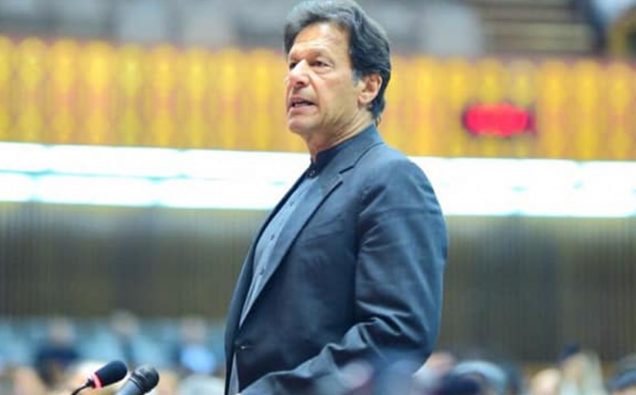
The Imran Khan Government feels the heat of a conditions-loaded IMF bailout deal as stocks plunged a day after the country concluded a $6 billion arrangement with the lending institution.
Despite the fact that Prime Minister Khan had informed the nation that it would have to swallow a bitter economic pill in the form or price-hike, political parties and business community has reacted negatively to the deal – badly needed to address balance of payment crisis.
On the floor of the Parliament, Opposition lawmakers mounted political pressure on the government and sought details of the deal and termed it a capitulation to the lending institution’s recipe for fixes to the economy.
But it was the bearish trend on the floor of Pakistan stock market that rocked the investor confidence as benchmark KSE-100 shares index shed 937 points during intra-day trading.
The trading, which opened at 34,716 points and showed an upward activity for a few minutes before bears took over.
The market closed at 33,900 points down 816 points or 2.4 per cent. The benchmark touched a day’s high at 35,228 points up 512 points during first few minutes of the session. It touched a day’s bottom at 33,779 points down 816 points or 2.4pc near the end of the session, according to English newspaper Dawn.
According to stock market brokers, the bourse has reacted negatively to the IMF conditions attached to the agreement including heavy taxation to be slapped on the consumers to improvise the target collection by a further PKR650-700bn. This may trigger further inflationary pressures and slowing down economic growth in Pakistan.
“Investors fear impact of prior actions and agreed conditions in the upcoming budget, leading to increase in taxes and utility prices to obtain a 39-month Extended Fund Facility (EFF) for $6b,” an analyst Ahsan Mehanti feared.
Moreover, the value of already fragile Rupee may experience free fall in the days to come, causing hyperinflation.
As per IMF conditions, Pakistan would also have to increase the central excise duty on service and agriculture sector, reduce expenditures on the public sector development program and increase mark up rate of banks.
The challenges are feared to further complicate economic job of the government. Some analysts says a fulfillment of the conditions might further scale down the GDP growth rate in the next fiscal year.
According to a think tank, Topline Research, the government is expected to let the rupee depreciate 13-17% to Rs160-165 against the US dollar by December 2019 and the key interest rate may be raised by 1.25 percentage points to the peak of 12% during the year.
The central bank has already let the currency depreciate by 34% to Rs141.3 to the greenback and increased the interest rate by five percentage points to 10.75% since December 2017.
The proposed steps are feared to slow down economic activities as reflected in contraction of the large-scale manufacturing sector and lower agricultural production, where additional impact came from poor water management.
“We may see major steps towards fiscal, monetary and structural reforms in the next few weeks either with or before the budget that is expected to be announced in the next few weeks. These may include rupee depreciation/free float, further hike in interest rate, increase in energy prices, elimination of subsidies, new and more taxes, aggressive privatization among others,” the research house stated.
Imran Khan’s PTI government enjoys confidence of the majority of people in the country. But that may not continue to be the case. His political platform relied heavily on anti-corruption slogans. But analysts warn tat inflation and unemployment may be too much of a cost for the people to pay.


















[…] – which has for far too long slept over economic reform decisions – entered into a conditions-loaded deal with International Monetary Fund, it reflected a low point for a country has the potential to grow into a $2 trillion economy but […]